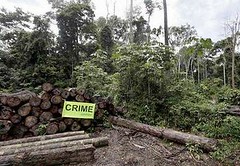 巴西總統羅賽芙(Dilma Rousseff)日前在世界環境日慶祝會上宣布成立新的國家公園與生物保護區:佔地8500公頃的Furna Feia國家公園,位於北方的北里奥格蘭德州(Rio Grande do Norte),而面積34000公頃的Bom Jesus生物保護區則為於南方的巴拉那州(Parana)。
巴西總統羅賽芙(Dilma Rousseff)日前在世界環境日慶祝會上宣布成立新的國家公園與生物保護區:佔地8500公頃的Furna Feia國家公園,位於北方的北里奥格蘭德州(Rio Grande do Norte),而面積34000公頃的Bom Jesus生物保護區則為於南方的巴拉那州(Parana)。
Furna Feia原意為「醜陋的洞穴」,是該州最大的洞穴系統,迄今已發現超過200個洞穴。約有105種植物與135種動物生存於新國家公園內,包括一些瀕危的物種。
羅賽芙同時宣布將擴大巴希亞洲(Bahia)的Descobrimento國家公園,及位於施亞拉州(Ceara)與聖埃斯皮里圖州(Espirito Santo)的Araripe-Apodi與Goytacazes 國家森林保護區的面積。
 羅賽芙在會中表示,根據國家太空研究院(National Institute for Space Research)自1988年起所拍攝的衛星照片顯示,2010年8月至2011年7月亞馬遜森林的砍伐率達到歷史的新低。
羅賽芙在會中表示,根據國家太空研究院(National Institute for Space Research)自1988年起所拍攝的衛星照片顯示,2010年8月至2011年7月亞馬遜森林的砍伐率達到歷史的新低。
巴西環境部長Izabella Teixeira表示,巴西仍保有81.2%的原始森林。
但世界各地的環保人士仍然擔心巴西森林的未來。而日前羅賽芙總統已否決了巴西國會眾議院4月份通過之新森林法規中的某些條款。那些條款放寬了伐木的限制,並讓許多地主得以逃避造林的規定。
 5月28日,羅賽芙否決該法案的12項條款。雖然她並未受到環保人士的輿論壓力而否決整個新法案,但她仍刪除了該法案最具爭議的條款,包括不再追究任何2008年7月前非法砍伐行為的法律責任。
5月28日,羅賽芙否決該法案的12項條款。雖然她並未受到環保人士的輿論壓力而否決整個新法案,但她仍刪除了該法案最具爭議的條款,包括不再追究任何2008年7月前非法砍伐行為的法律責任。
羅賽芙重聲地主應以造林來復原非法砍伐的責任,而小農戶在這方面則可有豁免權。
在羅賽芙的最新版法案中,地主必須讓土地保有一定的森林覆蓋率下,從沿海地區的20%至亞馬遜的80%。
羅賽芙表示,行使否決權乃是為了在農業與環境利益間取得平衡。
現任與前任共10位巴西環境部長同樣反對那些條款,他們認為新法案是「背道而馳」的作法,並已上書給Rousseff總統與國會議員,希望拒絕新法案。
當國會重新審視這些法條,勢必又有一番爭論。立法者將在9月前以多數表決決定是否廢除羅賽芙的否決意見。除非國會通過,否則以行政命令方式執行之否決權,將於7月底失效。
 在世界環境日的慶祝活動中,羅賽芙為保護巴西的自然環境簽署了一道法令,以建立巴拉那帕內馬河(Paranapanema River)流域委員會。流域委員會將由州級、市府級與民間代表所組成,決定如何使用與保護環境資源、資金分配與管理、衝突仲裁與公眾教育計劃等有關的事項。
在世界環境日的慶祝活動中,羅賽芙為保護巴西的自然環境簽署了一道法令,以建立巴拉那帕內馬河(Paranapanema River)流域委員會。流域委員會將由州級、市府級與民間代表所組成,決定如何使用與保護環境資源、資金分配與管理、衝突仲裁與公眾教育計劃等有關的事項。
同日,羅賽芙簽署了一項法令,建立政府採購之永續標準。她向國會說明簽署名古屋議定書(Nagoya Protocol)的過程,並說明共享遺傳資源的價值。另外,她也向國會表達了波昂公約(遷徙性野生動物保育公約,Bonn Convention of the Conservation of Migratory Species of Wild Animals)的重要性。
During a ceremony to celebrate World Environment Day, Brazilian President Dilma Rousseff today announced the establishment of a new national park and a biological reserve.
The new 8,500-hectare Furna Feia National Park is in the northern state of Rio Grande do Norte, while the 34,000-hectare Bom Jesus Biological Reserve is in the southern state of Parana.
Furna Feia, which translates as Ugly Cavern, is the largest cave complex in the state, with more than 200 caverns found so far. About 105 species of plants and 135 species of animals live in the newly designated park, including several that are endangered.
President Rousseff also announced the expansion of the Descobrimento National Park in the state of Bahia, the Araripe-Apodi National Forest in Ceara state, and the Goytacazes National Forest in Espirito Santo.
During the ceremony, Rousseff said that deforestation rates in the Brazilian Amazon from August 2010 to July 2011 reached the lowest annual level on record since the National Institute for Space Research began satellite monitoring in 1988.
Brazilian Environment Minister Izabella Teixeira says that 81.2 percent of Brazil's original forest remains.
But environmentalists around the world are worried about the future of Brazilian forests now that President Rousseff has vetoed only some of the provisions of a new Forest Code passed in April by the lower house of Brazil's National Congress.
The changes ease logging restrictions and allow for many landowners to escape reforesting requirements.
On May 28, President Rousseff vetoed 12 sections of the bill. While she rejected environmentalists' pressure to veto the entire new Code, she removed some of the bill's most controversial sections, including an amnesty for any illegal logging conducted before July 2008.
Rousseff restored the obligation of landowners to restore forests that were cut down illegally, but smallholders are exempt from this requirement.
Under Rousseff's latest version of the Code, landowners must keep a portion of their lands under forest cover, from 20 percent for lands in coastal regions up to 80 percent in the Amazon.
Rousseff explained the partial veto as a realistic balance of agricultural and environmental interests.
The changes are also opposed by Brazil's current and former ministers of the environment. All 10 of those who have held this post since the ministry was created sent a letter to President Rousseff and members of Congress, urging them to reject the reforms, which they describe as a "retrograde step."
As Congress reviews the new language, more controversy is expected. The lawmakers have until September to overturn Rousseff's vetoes, which takes a majority vote of both houses. The vetoes, expressed in an executive order, will expire in late July unless approved by Congress.
At the World Environment Day celebration, President Rousseff took further action to protect Brazil's environment by signing a decree creating the Watershed Committee of the Paranapanema River. Watershed committees made up of state, municipal and civil society representatives decide on matters related to usage and conservation, funds allocation and services, conflict arbitration and public education programs.
Also today, the President signed a decree establishing sustainable criteria for government procurement. She sent a message to Congress justifying the process of ratification of the Nagoya Protocol on access to and sharing of benefits arising from the use of genetic resources. And the President sent a separate message to Congress on the importance of the Bonn Convention for the conservation of migratory species of wild animals.





